 Buried Memories (Ishmael Jones, #10) by Simon R. Green
Buried Memories (Ishmael Jones, #10) by Simon R. Green Format: eARC
Source: supplied by publisher via NetGalley
Formats available: hardcover, paperback, ebook, audiobook
Genres: horror, mystery, paranormal, urban fantasy
Series: Ishmael Jones #10
Pages: 219
Published by Severn House on October 25, 2022
Purchasing Info: Author's Website, Publisher's Website, Amazon, Barnes & Noble, Kobo, Bookshop.org, Better World Books
Goodreads
Returning to the small town where he crash-landed in 1963, Ishmael Jones is in search of answers. But his investigation is de-railed by a brutal murder.
"I think something very bad and very dangerous has come to your little town, Inspector . . ."
As long-buried memories from his hidden past begin to resurface, Ishmael Jones and his partner Penny feel compelled to return to the small country town where Ishmael crash-landed in 1963; the place where his memories began.
Norton Hedley is no ordinary town. Apparitions, sudden disappearances, sightings of unusual beasts: for centuries, the place has been plagued by a series of inexplicable events. Ishmael's first task is to track down local author Vincent Smith, the one man he believes may have some answers.
Ishmael and Penny aren't the only ones seeking the mysterious Mr Smith. When their search unearths a newly-dead body in the local mortuary - a body that's definitely not supposed to be there - Ishmael becomes the prime suspect in the ensuing murder investigation. His only hope of discovering the truth about his origins lies in exposing a ruthless killer.
My Review:
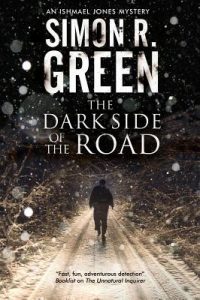 Ishmael Jones is as he has always been. The problem is that he’s been the same, absolutely unaging, for 60 years now. And he doesn’t remember who – or more likely what – he was before that. Before 1963, when his alien space ship was blown out of the sky over Earth and crashed in a field near the tiny village of Norton Hedley.
Ishmael Jones is as he has always been. The problem is that he’s been the same, absolutely unaging, for 60 years now. And he doesn’t remember who – or more likely what – he was before that. Before 1963, when his alien space ship was blown out of the sky over Earth and crashed in a field near the tiny village of Norton Hedley.
Which doesn’t seem to have changed much either in the intervening 60 years.
A situation that is quite a bit more worrying than Ishmael’s own unchanging face, because he at least knows why THAT’s happening. Or not, as the case may be.
But Norton Hedley, a place where people come and go and live in hope for a good tourist season every year, seems to be a haven for the uncanny. After all, that’s what has brought Ishmael and his partner Penny to the village.
Because Ishmael and his unchanging appearance began – at least as far as his memory goes – with the crash landing of his alien spacecraft in the woods surrounding Norton Hedley in 1963. He’s returned because his previous two cases, Night Train to Murder and The House on Widows Hill, have provided him with some scattered but ominous clues about who and what he used to be.
 And he needs to know. Because he needs to know if he’s a danger to Penny. Or anyone else on Earth who doesn’t deserve it.
And he needs to know. Because he needs to know if he’s a danger to Penny. Or anyone else on Earth who doesn’t deserve it.
In his research about Norton Hedley, or the research the coyly named black ops group, the Organisation, has done on his behalf, he – and they – have learned that Norton Hedley has been weird central for years. Not just the years since his ship crashed in 1963, but for centuries. Millenia even.
Something in, on, or more likely under – like the thing that was under The House on Widows Hill – has been creeping its creepy way along into the lifeblood of the town for eons uncounting. It might have the answers he’s been searching for for decades.
And it might not want to let him know.
Escape Rating B: This series has been one of my Halloween reads since I first discovered it, so it seemed appropriate to finish it up this Halloween. As I’ve already read the final book in the series (so far), I’ll have to pick something else horror-adjacent next year.
The author is an acquired taste – one that I acquired decades ago. It’s the snark. It’s always been the snark no matter what the ostensible genre or subject of ANY of his many series might be. If you like his voice, then when you’re in that mood nothing else will do. But if you’re not, you bounce off, and bounce hard. Your reading mileage may vary.
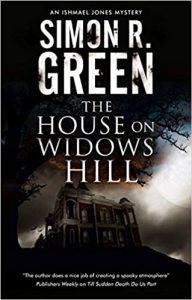 The concept of this particular series throws a whole bunch of speculative fiction tropes into one hell of a blender. The series began, back in The Dark Side of the Road, as English country house mysteries where the supernatural agencies turn out to be merely human – but with a touch of the paranormal or extraterrestrial for spice and added bodies.
The concept of this particular series throws a whole bunch of speculative fiction tropes into one hell of a blender. The series began, back in The Dark Side of the Road, as English country house mysteries where the supernatural agencies turn out to be merely human – but with a touch of the paranormal or extraterrestrial for spice and added bodies.
Over the course of the series it has turned into Ishmael’s quest to learn enough about who or what he used to be to figure out just how he can continue to stay one step ahead of all the various secret agencies that would like to use him up in one way or another. Even more important, he’s thoroughly invested in keeping Penny safe – if necessary from himself.
At first, what made this series work as well as it does – at least for this reader – was the revelation in each case that no matter how weird things got – often very – that the enemies were always human after all.
What has kept me going this far have been the questions about Ishmael’s past and Penny’s future. While Ishmael has been unchanging for 60 years, the series has been set in a sort of ‘perpetual now’. Days and weeks pass but seemingly not years. This entry in the series is one of the first that confronts head on the problem of Ishmael and Penny’s relationship.
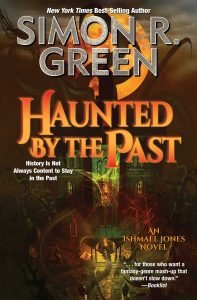 Not that they have problems, but that together they have a problem. Penny is an ordinary human, she will age, and Ishmael will not. Short of a deus ex machina – and not that there haven’t been plenty of powerful machina around over the course of the series – this can’t end happily. Howsomever, I already know that it does not end in the next book, Haunted by the Past. And in spite of the ominousness of that title, it doesn’t dive nearly as deeply into Ishmael’s past as Night Train to Murder, The House on Widows Hill and Buried Memories have done.
Not that they have problems, but that together they have a problem. Penny is an ordinary human, she will age, and Ishmael will not. Short of a deus ex machina – and not that there haven’t been plenty of powerful machina around over the course of the series – this can’t end happily. Howsomever, I already know that it does not end in the next book, Haunted by the Past. And in spite of the ominousness of that title, it doesn’t dive nearly as deeply into Ishmael’s past as Night Train to Murder, The House on Widows Hill and Buried Memories have done.
So, I have begun to wonder if the author is planning to end this series at all. I wonder even more whether or not he should. I’d rather just think of Ishmael and Penny in that perpetual now, continuing on their quest to find evil humans at the heart of supernatural hoaxes, raging together against the dying of their light.

 Graveyard Shift by
Graveyard Shift by  Haunt Sweet Home by
Haunt Sweet Home by  This World Is Not Yours by
This World Is Not Yours by  Instead, this is a story where this planet’s equivalent of Gaia manifests as an actual persona, and she has a mission and an agenda to keep the planet in ecological balance at ALL costs. Once she’s decided that the humans are incapable of being anything other than what they are – greedy and rapacious – well, a planet’s gotta do what a planet’s gotta do.
Instead, this is a story where this planet’s equivalent of Gaia manifests as an actual persona, and she has a mission and an agenda to keep the planet in ecological balance at ALL costs. Once she’s decided that the humans are incapable of being anything other than what they are – greedy and rapacious – well, a planet’s gotta do what a planet’s gotta do. Crypt of the Moon Spider (Lunar Gothic Trilogy, #1) by
Crypt of the Moon Spider (Lunar Gothic Trilogy, #1) by  The SFnal aspects of the story were enough to carry me over – or perhaps through – the horror aspects of the thing, except for the image of Veronica left in my mind at the end. For anyone who has ever played
The SFnal aspects of the story were enough to carry me over – or perhaps through – the horror aspects of the thing, except for the image of Veronica left in my mind at the end. For anyone who has ever played  Out of the Drowning Deep by
Out of the Drowning Deep by  But the two books that I felt most keenly related to Out of the Drowning Deep were, on the one hand,
But the two books that I felt most keenly related to Out of the Drowning Deep were, on the one hand,  A Sorceress Comes to Call by
A Sorceress Comes to Call by 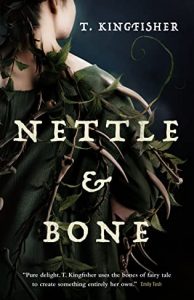 Escape Rating A+: This wasn’t what I expected, although having read quite a bit of the author’s work, I probably should have.
Escape Rating A+: This wasn’t what I expected, although having read quite a bit of the author’s work, I probably should have.  Which is when I felt like I got hit with a clue-by-four, to the point of chagrin that I didn’t figure out a whole bunch of things sooner. Not the way that Hester got the best of the sorceress, but rather the way that the story as a whole worked. And, as I mulled things over more than a bit, the way that
Which is when I felt like I got hit with a clue-by-four, to the point of chagrin that I didn’t figure out a whole bunch of things sooner. Not the way that Hester got the best of the sorceress, but rather the way that the story as a whole worked. And, as I mulled things over more than a bit, the way that 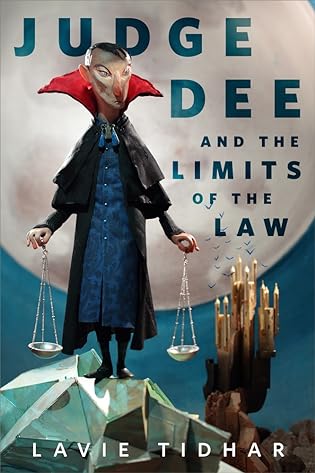 Judge Dee and the Limits of the Law (Judge Dee, #1) by
Judge Dee and the Limits of the Law (Judge Dee, #1) by 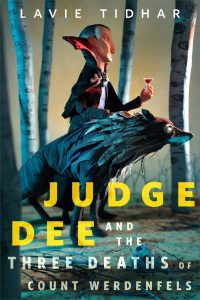 What makes the story fun – more than fun enough that I’ll be picking up the next story the next time I need something short to tide me over an overcommitted calendar – is the first person perspective of poor, put upon, Jonathan. He’s snarky, he’s both world-weary and vampire-weary, but he’s always aware of the side on which his bread is buttered – when he can get any, that is. So his commentary covers the Judge, the law he administers, his opinions and predilections, but also the companionship they provide each other.
What makes the story fun – more than fun enough that I’ll be picking up the next story the next time I need something short to tide me over an overcommitted calendar – is the first person perspective of poor, put upon, Jonathan. He’s snarky, he’s both world-weary and vampire-weary, but he’s always aware of the side on which his bread is buttered – when he can get any, that is. So his commentary covers the Judge, the law he administers, his opinions and predilections, but also the companionship they provide each other. Court of Wanderers (Silver Under Nightfall, #2) by
Court of Wanderers (Silver Under Nightfall, #2) by 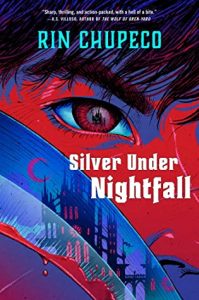 Escape Rating A++: The SQUEE is strong with this review. Let’s get into at least a bit of the why of that fact.
Escape Rating A++: The SQUEE is strong with this review. Let’s get into at least a bit of the why of that fact. No One Goes Alone by
No One Goes Alone by